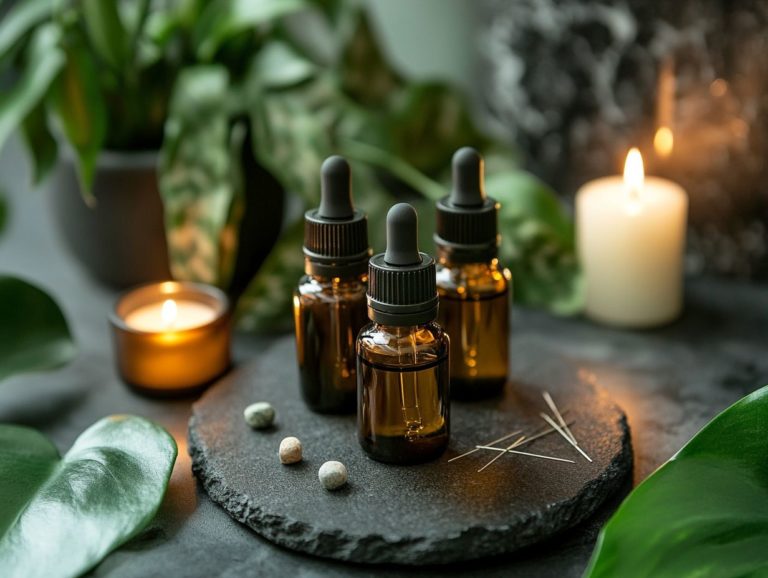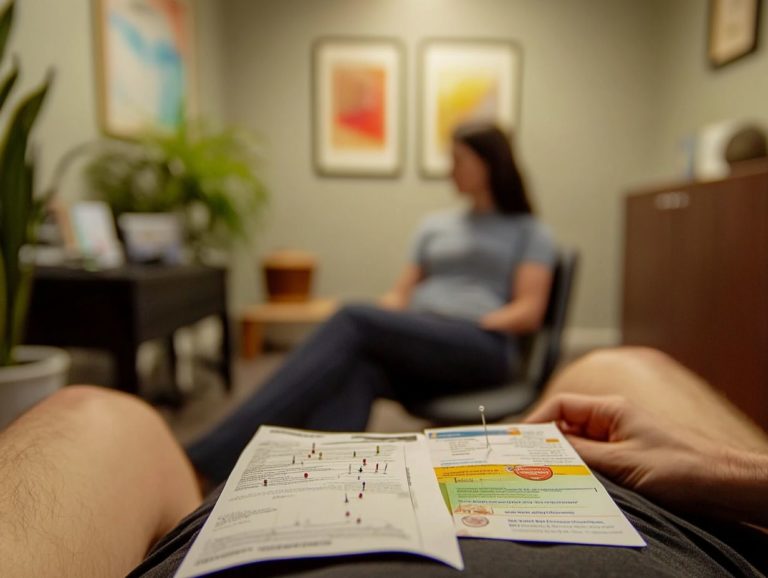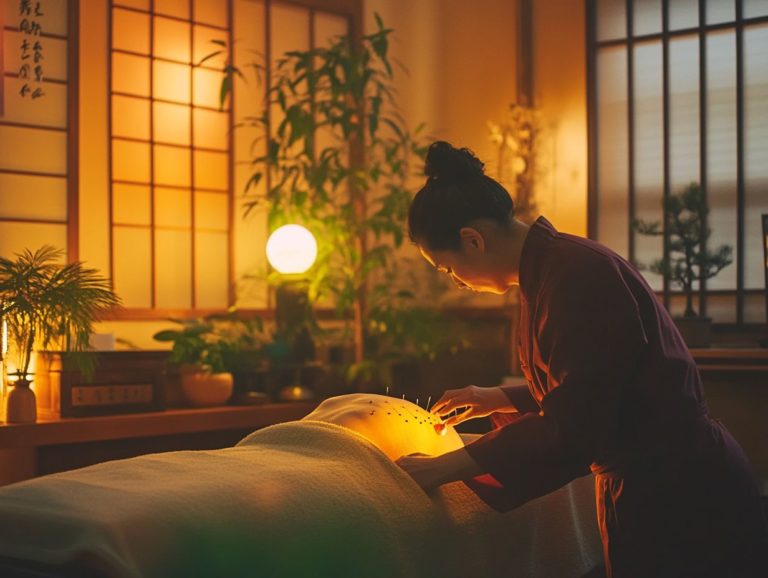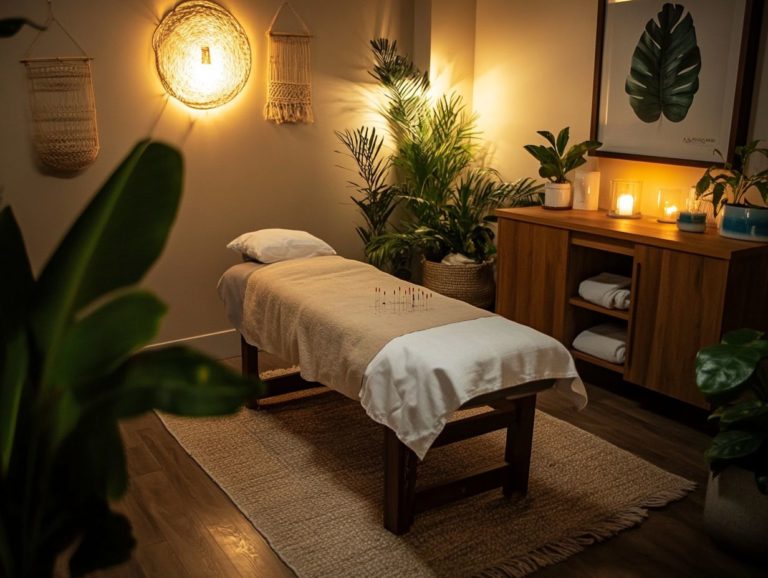Acupuncture for Allergies: What You Need to Know
Allergies can disrupt your quality of life, prompting a search for effective relief.
Acupuncture, an ancient practice grounded in Traditional Chinese Medicine, offers a natural alternative for managing allergy symptoms. This article will explain what acupuncture is, how it can help with different types of allergies, and what you can expect during a session.
It will also guide you in finding a qualified acupuncturist and highlight potential side effects to consider.
Discover how acupuncture might be the relief you’ve been searching for!
Contents
- Key Takeaways:
- Overview of Acupuncture for Allergies
- How Acupuncture Can Help with Allergies
- Types of Allergies Treated by Acupuncture
- What to Expect During an Acupuncture Session
- Finding a Qualified Acupuncturist
- Potential Side Effects of Acupuncture for Allergies
- Frequently Asked Questions
- What is acupuncture and how can it help with allergies?
- Is acupuncture a safe and effective treatment for allergies?
- How many acupuncture sessions are typically needed for allergies?
- Are there any side effects of acupuncture for allergies?
- Can acupuncture be used in conjunction with other allergy treatments?
- Is acupuncture for allergies covered by insurance?
Key Takeaways:

- Acupuncture is a natural way to relieve allergy symptoms.
- It can treat common allergies like hay fever and food allergies.
- Finding a qualified acupuncturist is crucial.
- Be aware of potential side effects before starting treatment.
Overview of Acupuncture for Allergies
Acupuncture presents a holistic treatment approach deeply embedded in traditional Chinese medicine, attracting interest for its benefits in alleviating allergy symptoms and even for chronic fatigue, particularly allergic rhinitis and seasonal allergies.
This ancient practice focuses on balancing your body s energy, known as qi, which is the vital energy that flows in the body. It helps your immune system respond better to allergens, offering both an alternative and a complementary option to conventional treatments like antihistamines.
Clinical studies and meta-analyses support acupuncture’s effectiveness in reducing nasal symptoms and improving overall quality of life for individuals dealing with various allergic conditions.
What is Acupuncture?
Acupuncture is a therapeutic technique that involves inserting fine needles into specific points along the body’s energy pathways. This practice aims to restore the flow of qi, promoting overall health and well-being.
Deeply rooted in traditional Chinese medicine, acupuncture considers the whole person, not just symptoms. Practitioners believe that blockages in the flow of qi can lead to various ailments. By stimulating these points, they work to rebalance and harmonize your bodily functions.
The philosophy of acupuncture revolves around the concept of pathways in the body that carry energy.
Training for practitioners is thorough and extensive, covering both theoretical knowledge and hands-on techniques. This ensures they are well-equipped to locate and treat these acupuncture points effectively. The goal is not just to relieve symptoms but to improve your overall wellness.
How Acupuncture Can Help with Allergies
Acupuncture can be a valuable ally in your fight against allergies. By enhancing your immune system’s ability to respond to allergens, it can significantly alleviate symptoms like nasal congestion and inflammation.
This holistic approach addresses not just the physical symptoms of allergic rhinitis; it also involves immune modulation and stress relief, ultimately improving your overall satisfaction and quality of life.
Studies show that regular acupuncture therapy can provide significant benefits for your immune system, helping you manage both seasonal and environmental sensitivities more effectively.
Benefits of Acupuncture for Allergy Relief
The benefits of acupuncture for allergy relief are multifaceted, offering a reduction in inflammation linked to allergic rhinitis and enhancing your quality of life.
Many patients report significant reductions in nasal symptoms such as congestion and sneezing, which can greatly improve your daily experience.
Clinical studies have indicated that acupuncture boosts your immune response, helping your body manage allergic reactions more effectively. If you’re seeking natural alternatives to antihistamines, acupuncture offers a compelling option free from the side effects often associated with medications.
For example, a study published in the Journal of Allergy and Clinical Immunology revealed that acupuncture significantly improved allergy symptoms in participants, showcasing its potential as a viable treatment for those dealing with seasonal allergies. Additionally, acupuncture’s role in cancer care highlights its versatility in managing various health conditions.
If you’re tired of allergy symptoms, consider trying acupuncture today!
Types of Allergies Treated by Acupuncture
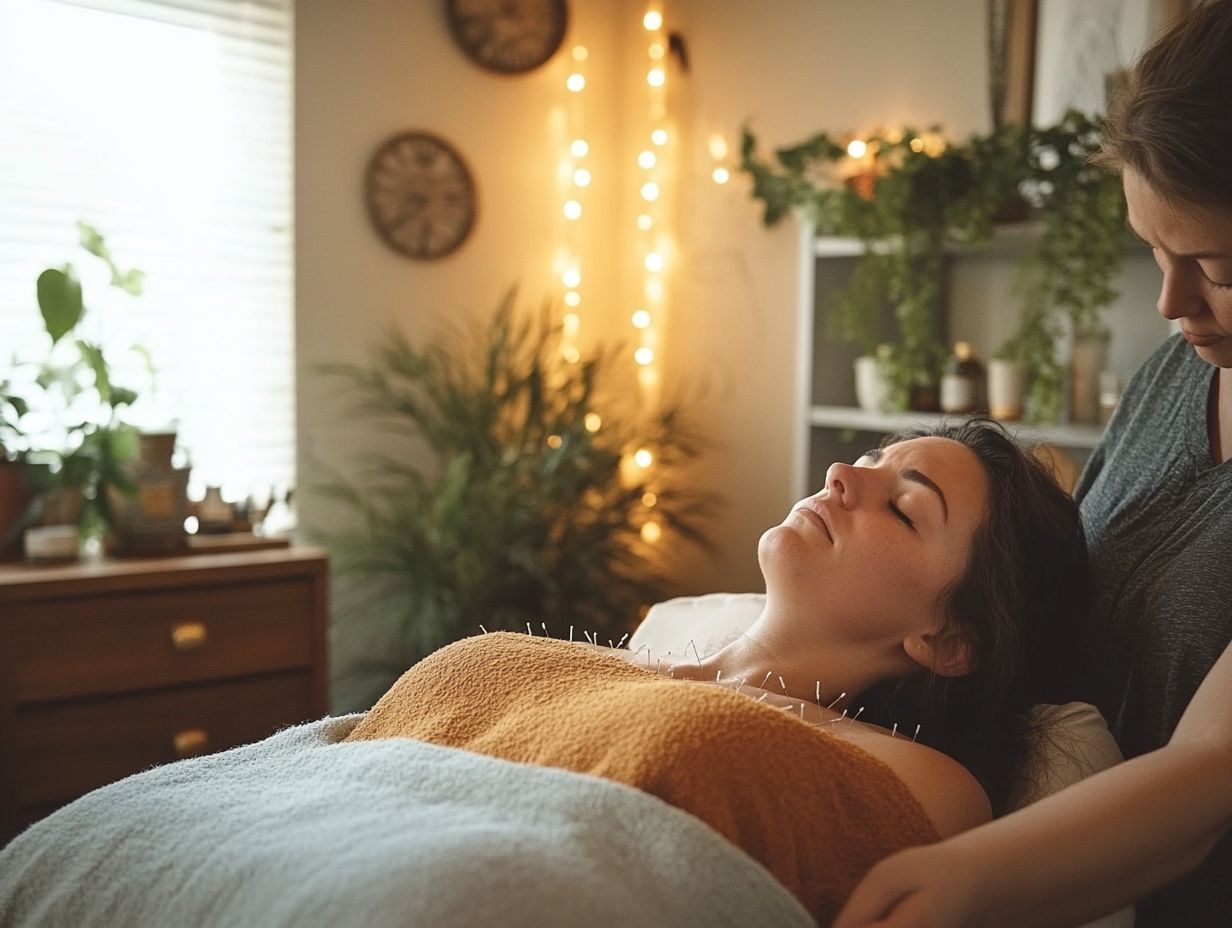
Acupuncture is a versatile treatment. It effectively manages many allergic conditions.
Whether you’re dealing with seasonal allergies, food sensitivities, or environmental triggers, this ancient practice has much to offer.
It also helps with chronic issues like allergic eczema, providing a holistic approach to enhance your overall well-being.
Common Allergies Treated with Acupuncture
Common allergies you can manage with acupuncture include hay fever, food allergies, and environmental sensitivities. Each presents unique challenges that acupuncture is adept at addressing.
These allergies often come with symptoms like sneezing, nasal congestion, skin rashes, and digestive disturbances. All of these can significantly disrupt your quality of life.
For allergic eczema, acupuncture targets discomfort by promoting balance and reducing inflammation. Practitioners customize your treatment plan by selecting specific acupoints to alleviate itching, redness, and irritation, ultimately enhancing your skin health.
Many people report fewer allergy symptoms after acupuncture treatments, highlighting its potential as an effective complementary therapy.
What to Expect During an Acupuncture Session
During an acupuncture session, you can expect a tranquil atmosphere.
Skilled practitioners will insert needles into designated acupuncture points, eliciting various sensations. You might feel warmth, tingling, or heaviness in the treated areas, contributing to a restorative experience.
Procedure and Possible Sensations
The acupuncture procedure is safe and minimally invasive. Practitioners target specific acupuncture points to evoke therapeutic sensations that vary from person to person.
During your session, ultra-fine, sterilized needles are gently inserted into the skin at well-defined points along the body’s energy pathways. You may feel a range of sensations from gentle tingling and warmth to heaviness or an electrical pulse these normal reactions indicate that energy is flowing through your body.
To ensure safety and comfort, practitioners follow strict hygiene protocols, using single-use needles in a clean environment. Many find themselves deeply relaxed or even a bit sleepy after treatment, reassured by the acupuncturist s professionalism and attention to comfort.
Finding a Qualified Acupuncturist
Finding a qualified acupuncturist is essential for effective treatment. When seeking a practitioner, ensure they are certified by reputable organizations, such as the National Certification Commission for Acupuncture and Oriental Medicine.
This certification guarantees safety and ensures the efficacy of your treatment.
Tips for Choosing the Right Practitioner
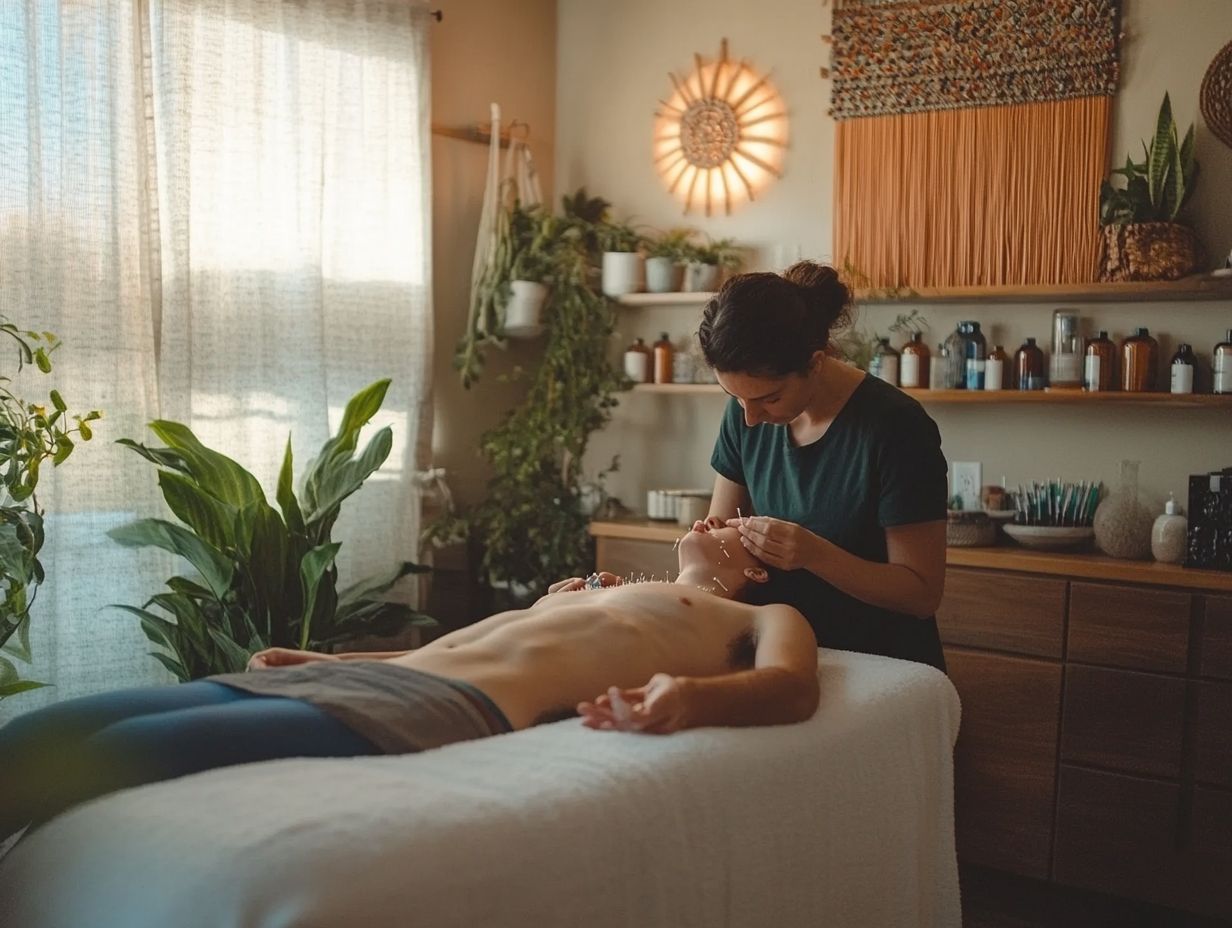
When selecting the right acupuncturist, consider their qualifications, patient reviews, and treatment approach. These elements profoundly influence your experience and the safety of the procedure.
Verify the acupuncturist’s credentials to ensure they have the necessary training and certification. Checking patient reviews offers insights into their effectiveness and bedside manner, allowing you to assess their level of care.
Inquire about their specific treatment methods to see if their approach aligns with your health needs and preferences.
Ultimately, evaluating these factors cultivates trust and enhances the likelihood of a successful therapeutic outcome.
Don t wait! Discover how acupuncture can help you feel better today.
Potential Side Effects of Acupuncture for Allergies
While acupuncture is typically regarded as a safe treatment option, it is important for you to be aware of potential side effects.
Being informed about these possibilities can enhance your comfort and satisfaction during the treatment, especially if you are managing allergic conditions.
Possible Risks and Precautions
Potential risks associated with acupuncture can include minor bruising and soreness. In rare instances, more serious complications may occur. It’s important to choose a skilled practitioner for optimal safety.
It is essential for you to ensure that your chosen therapist follows strict hygiene rules and uses sterilized needles to minimize any potential health hazards. Before your treatment, proactively communicate any health problems you might have; this will help your practitioner tailor their approach effectively to your needs.
Paying attention to how a practitioner prepares and maintains a clean environment can provide you with additional reassurance regarding safety.
Understanding the techniques used can help you feel more at ease, fostering a collaborative atmosphere that encourages open dialogue and alleviates anxiety. This, in turn, enhances your overall acupuncture experience.
Frequently Asked Questions
What is acupuncture and how can it help with allergies?
Acupuncture is a traditional Chinese medicine technique, a healing system from China that involves the insertion of thin needles into specific points on the body. It is believed to help balance the flow of energy in the body and stimulate the body’s natural healing processes, which can help alleviate symptoms of allergies such as congestion, sneezing, and itchy eyes. For more information, check out acupuncture for respiratory issues.
Is acupuncture a safe and effective treatment for allergies?

Acupuncture is generally considered safe when performed by a trained and licensed practitioner. While research on the effectiveness of acupuncture for allergies is limited, some studies have shown promising results in reducing symptoms and improving quality of life for allergy sufferers, including how acupuncture can help with seasonal allergies.
How many acupuncture sessions are typically needed for allergies?
The number of sessions needed for allergies varies for each individual and depends on the severity of symptoms. Some people may experience relief after just a few sessions, while others may need more regular treatments. Your acupuncturist will work with you to create a personalized treatment plan.
Are there any side effects of acupuncture for allergies?
In general, acupuncture is a low-risk treatment with minimal side effects. However, some people may experience mild bruising, soreness at the site of needle insertion, or temporary worsening of symptoms before improvement occurs. These side effects are typically mild and short-lived.
Can acupuncture be used in conjunction with other allergy treatments?
Yes, acupuncture can be used alongside other allergy treatments such as medication or allergy shots. It is important to consult with your healthcare provider before starting any new treatments and to inform your acupuncturist of any current treatments you are undergoing.
Is acupuncture for allergies covered by insurance?
Some insurance plans may cover acupuncture for allergies, but coverage varies. It is best to check with your insurance provider to see if they cover this type of treatment. Additionally, many acupuncturists offer payment plans or sliding scale fees for those without insurance coverage.

